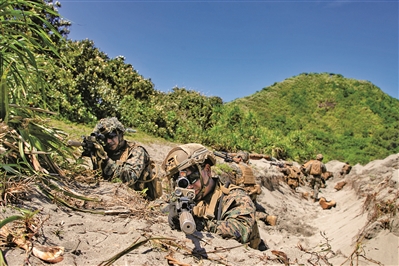
By Han Xu
The US will invest $66.5 million to help the Philippines upgrade and transform three military bases and the construction of the project will start in 2023 according to the Enhanced Defense Cooperation Agreement (EDCA) between the US and the Philippines, said the Department of National Defense of the Philippines recently. Lieutenant General Bartolome Bacarro, Chief of Staff of the Armed Forces of the Philippines (AFP), said that the US has proposed to build five additional military infrastructures in the Philippines that can be used by the US military, and relevant negotiations are ongoing.
The US and the Philippines signed the EDCA in 2014. According to the agreement, the US armed forces are allowed to station troops in the Philippines in rotation, use military bases in the Philippines, renovate or expand base facilities, and place weapons and equipment in the Philippines. At present, the Philippines has opened five military bases to the US, including Bautista Air Base, Basa Air Base in the south of Manila, Fort Magsaysay in the north of Manila, Lumbia Air Base in Mindanao and Mactan-Benito Ebuen air base in Cebu. The US proposes to build another five new military infrastructures, which will be located in Kalayaan, Palawan, Zambales and Isabela provinces.
Since the beginning of 2022, the defense cooperation between the US and the Philippines has continued to heat up. The US and the Philippines held the largest Balikatan joint military exercise in history in March, involving about 3,800 Filipino soldiers and 5,100 American soldiers. In August, US Secretary of State Antony Blinken emphasized during his visit to the Philippines that the Philippines is an "irreplaceable friend, partner and ally" to the US and promised to provide support to the Philippines when it is under attack.
In addition, the US and the Philippines are also actively promoting military procurement cooperation. The US Defense Security Cooperation Agency announced that the US State Department approved the sale of 12 F-16 fighter jets, more than 10 Harpoon anti-ship missiles, 24 Sidewinder air-to-air missiles and other equipment to the Philippines. The total arms sales are close to $2.9 billion.
For the US, the Philippines is an important fulcrum for its implementation of the Indo-Pacific Strategy. As a traditional ally of the US in the Asia-Pacific region, the Philippines is located in the middle of the "first island chain" in the "three-tier island chains" created by the US. It is in the key passage between the Indian Ocean and the Pacific Ocean, and its geostrategic position is very important. The US believes that building a forward military base in the Philippines will facilitate its involvement in Asia-Pacific affairs.
For the Philippines, strengthening military cooperation with the US can gain more interest and support. The new President of the Philippines, Ferdinand Marcos, is in the early stages of his administration. He hopes to build a more comprehensive and cohesive military alliance with the US and obtain military assistance from the US to strengthen his own military strength and gain the support of domestic pro-US forces.
The outside world believes that it is difficult for the US and the Philippines to strengthen defense cooperation due to their own respective interests. The US regards the Philippines as an important force in implementing its Indo-Pacific Strategy concept and seeking advantages in "major power competition". However, the Philippines is at a disadvantage in its asymmetric alliance with the US, and too much reliance on the US will affect its autonomy to a certain extent. Former Philippine President Rodrigo Duterte has always pursued a "balanced foreign policy". After Marcos came to power, the foreign policy of the Philippines tended to be pro-US. However, driven by the political legacy left by the previous government and its own strategic stance, there is a high probability that the Philippines will continue to seek diversified diplomatic cooperation to maximize its own interests in the game of major powers.













